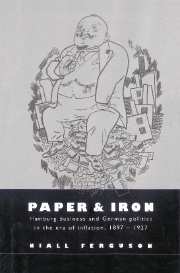Book contents
- Frontmatter
- Contents
- List of figures
- Preface
- List of abbreviations
- Introduction
- 1 Golden years
- 2 The sinews of war
- 3 The political economy of revolution
- 4 Versailles and Hamburg
- 5 Relative stabilisation
- 6 The failure of ‘fulfilment’
- 7 Dissolution and liquidation
- 8 The legacy of the inflation
- Epilogue: Hitler's inflation
- Appendix
- Bibliography
- Index
Preface
Published online by Cambridge University Press: 14 October 2009
- Frontmatter
- Contents
- List of figures
- Preface
- List of abbreviations
- Introduction
- 1 Golden years
- 2 The sinews of war
- 3 The political economy of revolution
- 4 Versailles and Hamburg
- 5 Relative stabilisation
- 6 The failure of ‘fulfilment’
- 7 Dissolution and liquidation
- 8 The legacy of the inflation
- Epilogue: Hitler's inflation
- Appendix
- Bibliography
- Index
Summary
In recent years, the historiography of the German inflation has itself developed inflationary tendencies. The academic printing presses have been kept almost as busy as the Reichsbank's in the early 1920s, such has been the volume of literature published on the subject. Nevertheless, I make no apologies for adding these pages to the paper flood. Most studies of the inflation concentrate on the years 1914–24. I have sought to describe a rather longer ‘era of inflation’ running from 1897 to 1927, and to show the links from the hyperinflation of 1922/3 to the second great inflation of the 1940s. Most authors emphasise to some degree the role of economic interest groups in causing the inflation and undermining the Republic; I have tried to suggest that corporate power was as much a product as a cause of the German Reich's weakness as a modern state. Finally, most recent work has tended to conclude that there was no alternative to inflationary policies in the circumstances of 1919–23; indeed, some historians have seen positive advantages in these policies. I argue not only that these advantages have been exaggerated, but also that alternative, less inflationary policies could conceivably have been pursued, with less disastrous consequences. In the inflation, it was possible to pay off debts with worthless money. I hope the following expressions of gratitude will offer slightly better recompense to my many intellectual creditors. Professor Norman Stone and Dr Hartmut Pogge von Strandmann acted as my successive doctoral supervisors in Oxford: I am grateful to them both.
- Type
- Chapter
- Information
- Paper and IronHamburg Business and German Politics in the Era of Inflation, 1897–1927, pp. xi - xiiPublisher: Cambridge University PressPrint publication year: 1995

